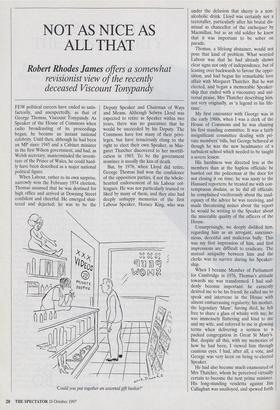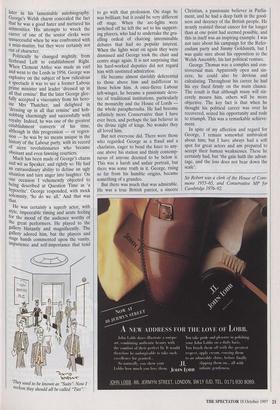NOT AS NICE AS ALL THAT
Robert Rhodes James offers a somewhat
revisionist view of the recently deceased Viscount Tonypandy
FEW political careers have ended so satis- factorily, and unexpectedly, as that of George Thomas, Viscount Tonypandy. As Speaker of the House of Commons when radio broadcasting of its proceedings began, he became an instant national celebrity. Until then, although he had been an MP since 1945 and a Cabinet minister in the first Wilson government, and had, as Welsh secretary, masterminded the investi- ture of the Prince of Wales, he could hard- ly have been described as a major national political figure.
When Labour, rather to its own surprise, narrowly won the February 1974 election, Thomas assumed that he was destined for high office and arrived at Downing Street confident and cheerful. He emerged shat- tered and dejected; he was to be the Deputy Speaker and Chairman of Ways and Means. Although Selwyn Lloyd was expected to retire as Speaker within two years, there was no guarantee that he would be succeeded by his Deputy. The Commons have lost many of their privi- leges, but have tenaciously clung to the right to elect their own Speaker, as Mar- garet Thatcher discovered to her mortifi- cation in 1983. To be the government nominee is usually the kiss of death.
But, by 1976, when Lloyd did retire, George Thomas had won the confidence of the opposition parties, if not the 'whole- hearted endorsement of his Labour col- leagues. He was not particularly trusted or liked by many of them, and they also had deeply unhappy memories of the first Labour Speaker, Horace King, who was 'Could you put together an assorted gift basket?' under the delusion that sherry is a non- alcoholic drink. Lloyd was certainly not a teetotaller, particularly after his brutal dis- missal as chancellor of the exchequer by Macmillan, but as an old soldier he knew that it was important to be sober on parade.
Thomas, a lifelong abstainer, would not pose that kind of problem. What worried Labour was that he had already shown clear signs not only of independence, but of leaning over backwards to favour the oppo- sition, and had begun his remarkable love affair with Margaret Thatcher. But he was elected, and began a memorable Speaker- ship that ended with a viscountcy and uni- versal praise, Mrs Thatcher describing him, not very originally, as 'a legend in his life- time'.
My first encounter with George was in the early 1960s, when I was a clerk of the House of Commons and he was chairing his first standing committee. It was a fairly insignificant committee dealing with pri- vate members' bills, but George behaved as though he was the new headmaster of a turbulent school which needed to be taught a severe lesson.
His harshness was directed less at the members than at the hapless officials: he bawled out the policeman at the door for not closing it on time; he was nasty to the Hansard reporters; he treated me with con- temptuous disdain, as he did all officials; he complained vociferously about the inad- equacy of the advice he was receiving, and made threatening noises about the report he would be writing to the Speaker about the miserable quality of the officers of the House.
Unsurprisingly, we deeply disliked him, regarding him as an arrogant, sanctimo- nious, deceitful and malicious bully. This was my first impression of him, and first impressions are difficult to eradicate. The mutual antipathy between him and the clerks was to survive during his Speaker- ship.
When I became Member of Parliament for Cambridge in 1976, Thomas's attitude towards me was transformed. I had sud- denly become important: he earnestly desired me to be his friend; he called me to speak and intervene in the House with almost embarrassing regularity; his mother, the legendary `Mam', having died, he felt free to share a glass of whisky with me; he was immensely flattering and kind to me and my wife, and referred to me in glowing terms when delivering a sermon to a packed congregation in Great St Mary's. But, despite all this, with my memories of how he had been, I viewed him through cautious eyes. I had, after all, a vote, and George was very keen on being re-elected Speaker.
He had also become much enamoured of Mrs Thatcher, whom he perceived virtually certain to become the next prime minister. His long-standing vendetta against Jim Callaghan was unalloyed, and spewed forth later in his lamentable autobiography. George's Welsh charm concealed the fact that he was a good hater and nurtured his animosities. His attempts to wreck the career of one of the senior clerks were unsuccessful when he was confronted with a mini-mutiny, but they were certainly not out of character.
Politically he changed mightily, from firebrand Left to establishment Right. When Clement Attlee was made an earl and went to the Lords in 1956, George was explosive on the subject of how ridiculous a spectacle it was to see a former Labour Prune minister and leader 'dressed up in all that ermine'. But the later George glee- !oily accepted a viscountcy from his hero- the Mrs Thatcher, and delighted in 'dressing up in all that ermine' and hob- nobbing charmingly and successfully with royalty. Indeed, he was one of the greatest establis1nnent converts of his time, although in this progression — or regres- sion — he was by no means unique in the history of the Labour party, with its record of stern revolutionaries who became obeisant and even fawning courtiers. Much has been made of George's charm and wit as Speaker, and rightly so. He had an extraordinary ability to defuse an ugly situation and turn anger into laughter. On one occasion I vehemently objected to being described at Question Time as `a hYpocrite'. George responded, with mock solemnity, 'So do we all.' And that was that.
He was certainly a superb actor, with Style, impeccable timing and acute feeling for the mood of the audience worthy of the great performers. He played to the gallery blatantly and magnificently. The gallery adored him, but the players and stage hands commented upon the vanity, Impatience and self-importance that tend They used to be known as "Suits". Now I reckon they should all be called "Ties".' to go with that profession. On stage he was brilliant; but it could be very different off stage. When the arc-lights were switched off he left the act to his support- ing players, who had to undertake the gru- elling ordeal of chairing interminable debates that had no popular interest. When the lights went on again they were dismissed and George took the chair and centre stage again. It is not surprising that his hard-worked deputies did not regard him with unstinted admiration.
He became almost slavishly deferential to those above him and indifferent to those below him. A once-fierce Labour left-winger, he became a passionate devo- tee of traditional institutions, particularly the monarchy and the House of Lords — the whole paraphernalia. He had become infinitely more Conservative than I have ever been, and perhaps the last believer in the divine right of kings. No wonder they all loved him.
But not everyone did. There were those who regarded George as a fraud and a charlatan, eager to bend the knee to any- one above his station and thinly contemp- tuous of anyone deemed to be below it. This was a harsh and unfair portrait, but there was some truth in it. George, rising so far from his humble origins, became something of a grandee.
But there was much that was admirable. He was a true British patriot, a sincere Christian, a passionate believer in Parlia- ment, and he had a deep faith in the good- ness and decency of the British people. He stoutly resisted throat cancer for far longer than at one point had seemed possible, and this in itself was an inspiring example. I was not sure about his campaign for the Refer- endum party and Jimmy Goldsmith, but I was quite sure about his opposition to the Welsh Assembly, his last political venture.
George Thomas was a complex and con- troversial man. Apparently open and sin- cere, he could also be devious and calculating. Throughout his career he had his eye fixed firmly on the main chance. The result is that although many will sin- cerely mourn him, others will be more objective. The key fact is that when he thought his political career was over he recovered, seized his opportunity and rode to triumph. This was a remarkable achieve- ment.
In spite of my affection and regard for George, I remain somewhat ambivalent about him; but I have always had a soft spot for great actors and am prepared to accept their human weaknesses. These he certainly had, but 'the gain hath the advan- tage, and the loss does not bear down the scale'.
Sir Robert was a clerk of the House of Com- mons 1955-65, and Conservative MP for Cambridge 1976-92.



























































































 Previous page
Previous page